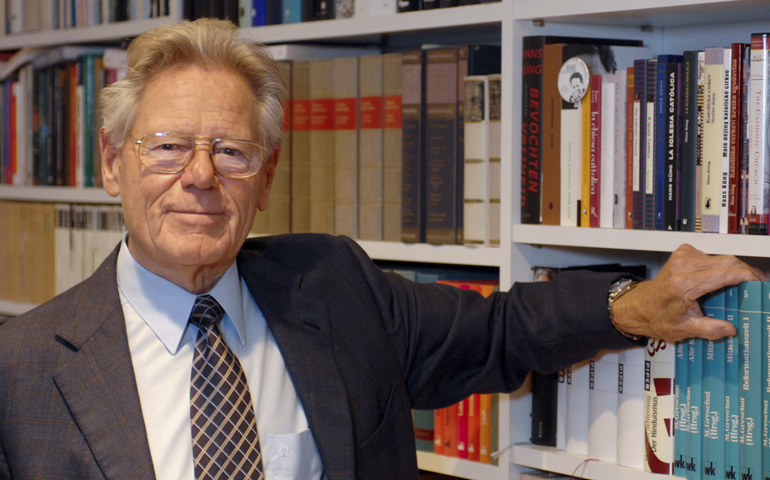
Theologian Fr. Hans Kung is pictured in his office in Tubingen, Germany, in a 2008 file photo. (CNS/Harald Oppitz, KNA)
Editor's note: Fr. Hans Küng, the Swiss theologian, says that he has received a letter from Pope Francis that responds "to my request to give room to a free discussion on the dogma of infallibility."
Küng declined to show the letter to NCR, citing "the confidentiality that I owe to the Pope," but he says the letter was dated March 20 and sent to him via the nunciature in Berlin shortly after Easter.
Küng says the letter shows that "Francis has set no restrictions" on the discussions.
Küng also said that he is very encouraged by Francis' recent apostolic exhortation, Amoris Laetitia ('The Joy of Love'), "I could not have foreseen then quite how much new freedom Francis would open up in his post-synodal exhortation," Kung wrote in statement released to NCR and other media outlets. "Already in the introduction, he declares, 'Not all discussions of doctrinal, moral or pastoral issues need to be settled by interventions of the magisterium.'"
Küng writes, "This is the new spirit that I have always expected from the magisterium" and makes a discussion of infallibility possible.
On March 9, Küng had issued what he called an "urgent appeal to Pope Francis to permit an open and impartial discussion on infallibility of pope and bishops." The appeal was released simultaneously in multiple languages and publications. NCR and The Tablet of London released the English language version. (NCR, March 25-April 7).
Following is the text of the statement about the pope's letter that Küng released to media. The English version is being released simultaneously by National Catholic Reporter and The Tablet at midnight April 27 (7 p.m. Eastern time, April 26 in the United States).
-- Dennis Coday, NCR editor
On March 9, my appeal to Pope Francis to give room to a free, unprejudiced and open-ended discussion on the problem of infallibility appeared in the leading journals of several countries. I was thus overjoyed to receive a personal reply from Francis immediately after Easter. Dated March 20, it was forwarded to me from the nunciature in Berlin.
In the pope's reply, the following points are significant for me:
- The fact that Francis answered at all and did not let my appeal fall on deaf ears, so to speak;
- The fact that he replied himself and not via his private secretary or the secretary of state;
- That he emphasizes the fraternal manner of his Spanish reply by addressing me as Lieber Mitbruder ("Dear Brother") in German and puts this personal address in italics;
- That he clearly read the appeal, to which I had attached a Spanish translation, most attentively;
- That he is highly appreciative of the considerations that had led me to write Volume 5 of my complete works, in which I suggest theologically discussing the different issues that the infallibility dogma raises in the light of holy Scripture and tradition with the aim of deepening the constructive dialogue between the "semper reformanda" 21st-century church and the other Christian churches and postmodern society.
Francis has set no restrictions. He has thus responded to my request to give room to a free discussion on the dogma of infallibility. I think it is now imperative to use this new freedom to push ahead with the clarification of the dogmatic definitions, which are a ground for controversy within the Catholic church and in its relationship to the other Christian churches.
I could not have foreseen then quite how much new freedom Francis would open up in his post-synodal exhortation, Amoris Laetitia. Already in the introduction, he declares, "Not all discussions of doctrinal, moral or pastoral issues need to be settled by interventions of the magisterium."
He takes issue with "cold bureaucratic morality" and does not want bishops to continue behaving as if they were "arbiters of grace." He sees the Eucharist not as a reward for the perfect but as "nourishment for the weak."
He repeatedly quotes statements made at the episcopal synod or from national bishops' conferences. Francis no longer wants to be the sole spokesman of the church.
This is the new spirit that I have always expected from the magisterium. I am fully convinced that in this new spirit a free, impartial and open-ended discussion of the infallibility dogma, this fateful key question of destiny for the Catholic church, will be possible.
I am deeply grateful to Francis for this new freedom and combine my heartfelt thanks with the expectation that the bishops and theologians will unreservedly adopt this new spirit and join in this task in accordance with the Scriptures and with our great church tradition.
[Fr. Hans Küng, Swiss citizen, is professor emeritus of ecumenical theology at Tübingen University in Germany. The sixth volume of his complete works, Church Reform, is expected later this year from Herder. This article was translated from the German by Christa Pongratz-Lippitt.]



